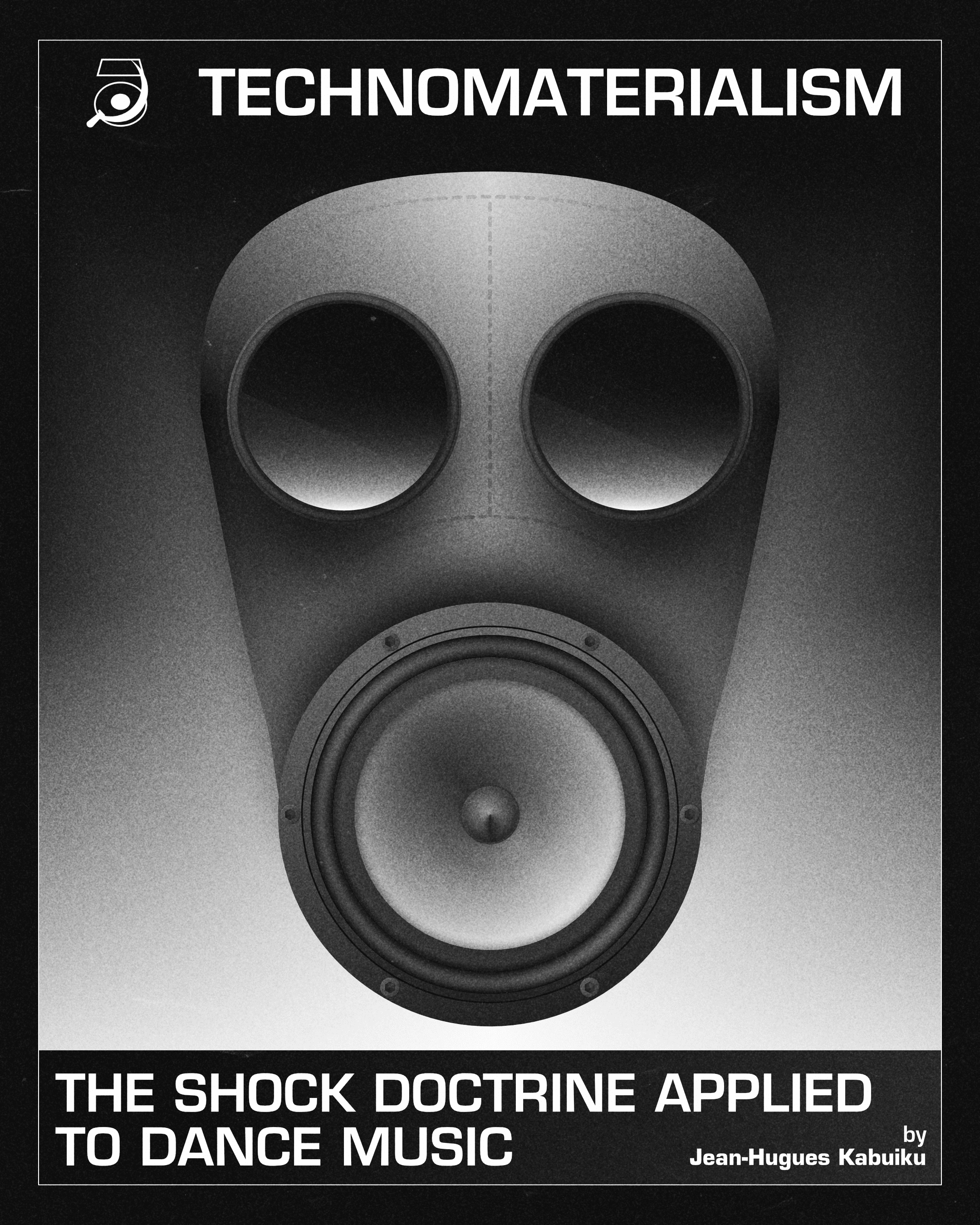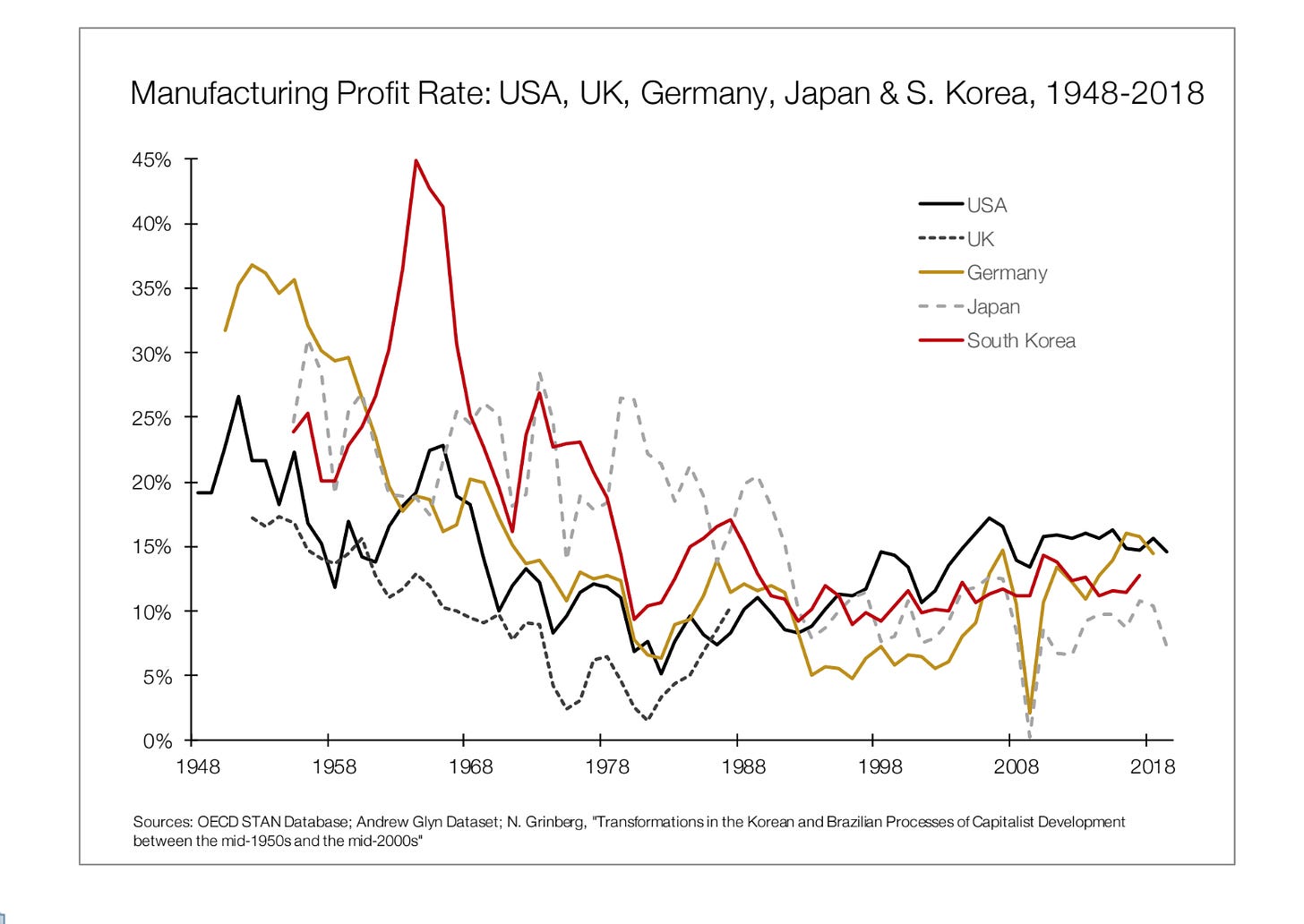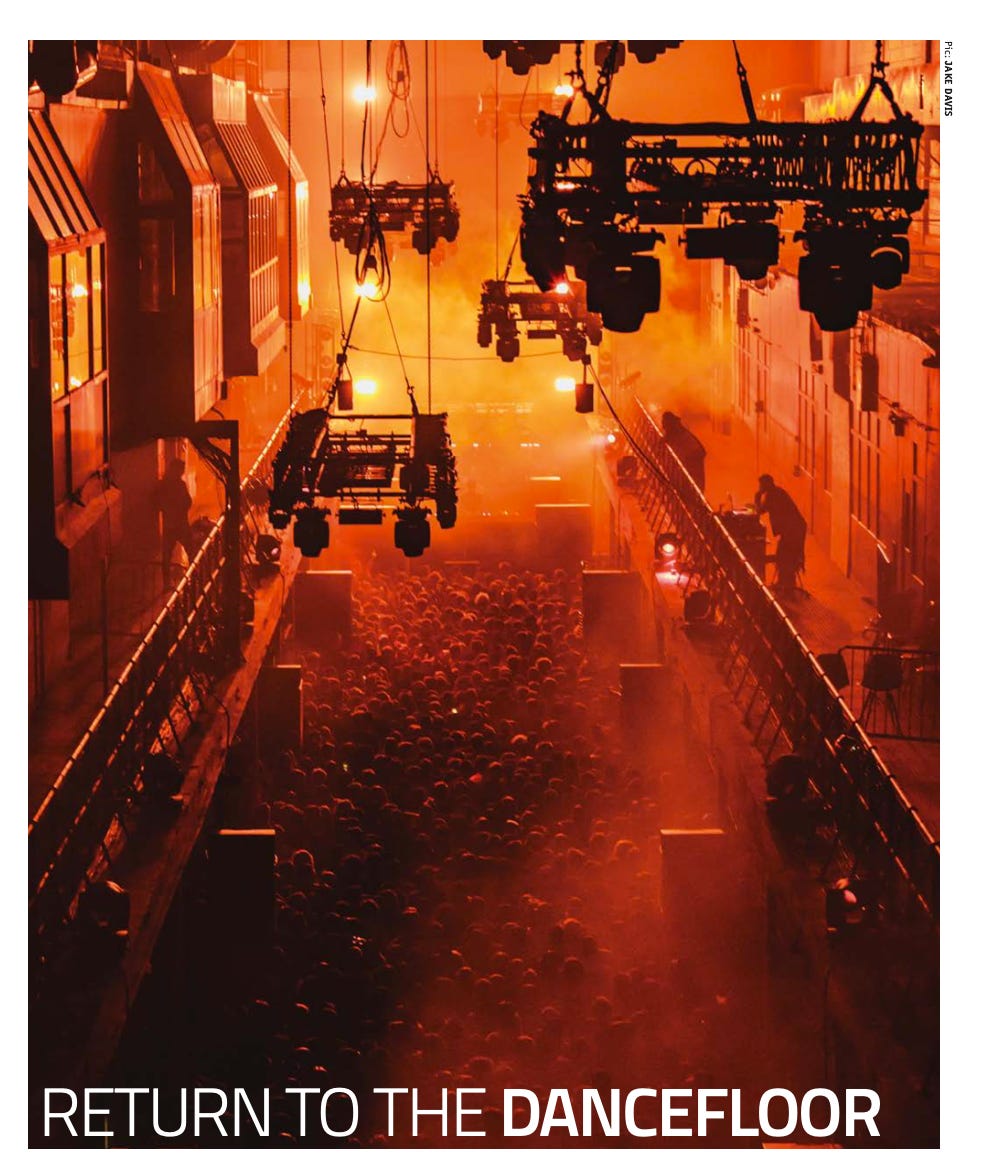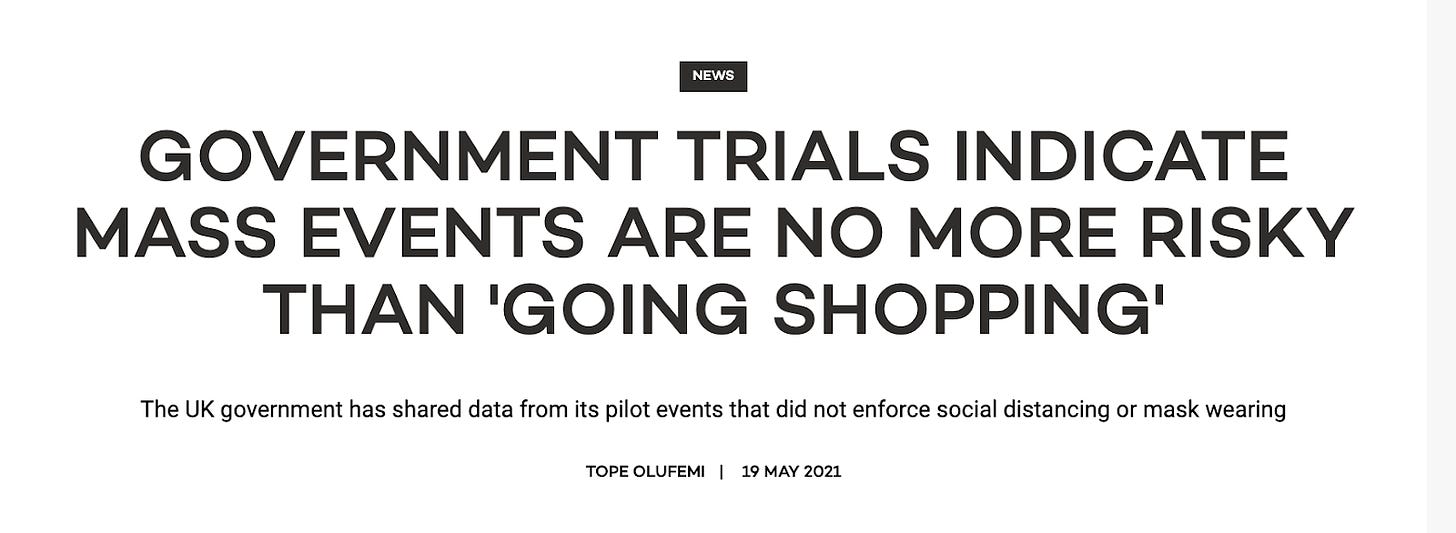Watch as the COVID crisis accelerates the crisis in the mode of production; the insurrection has come in 2020, but not the revolution. What is the principal ideological force behind what I am calling “the Shock Doctrine applied to dance music”?
Following Naomi Klein’s thesis in her book The Shock Doctrine that when in crisis, capital picks the most heinous representative of ruthless capitalism to answer to it. As Klein notes, Milton Friedman highlighted in his essay “capitalism and freedom ix”, on the contemporary capitalism operative system.
"only a crisis—actual or perceived—produces real change. When that crisis occurs, the actions that are taken depend on the ideas that are lying around. That, I believe, is our basic function: to develop alternatives to existing policies, to keep them alive and available until the politically impossible becomes politically inevitable."
In this essay, I attempt to give an alternative to discourses anchored in the historical erasure of any radical left expression within culture, a sort of Mcarthysm in dance music if I may.
The COVID-19 pandemic has accelerated crisis in the mode of production that was already present in our capitalist economy. In order to understand, and offer an alternative to, the present moment, analysis of the feudal nature of our actual economic system is necessary. As Jodi Dean writes, "recognizing that capitalism is becoming neo-feudal pushes us away from hopes that any election or set of small reforms are even slightly adequate to the present catastrophe.” Alongside the existing crisis in the mode of production there is a turn towards value-extraction, as opposed to production, the re-emergence of feudal relations of production and their translation to subscription-models in the culture industries.
The principal thesis of this essay is that we can’t see technology (in this context the tech industry and it’s adjacent) as just simply a tool1.
It’s Interesting to highlight that Milton Friedman’s grandson Patri Friedman, who’s father is the anarcho-capitalist theorist and member of The Libertarian Party, David Friedman, is behind the Seasteading project, which is trying to build sovereign ocean colonies. Definitely Trying to finish where grandpa left out.
First, Feudalism and its relevance for understanding today’s digital economy. — To begin, we have to emphasize what feudalism, slavery and capitalism have in common. In all three configurations, the legal ownership of at least part of the assets indispensable to production is monopolized by a dominant class. In the case of feudalism, it is the land that is monopolized by feudal lords, with direct producers owning only the instruments necessary to produce their subsistence goods. In capitalism and slavery, the totality of the means of production belongs to the dominant class. This legal monopoly of the assets indispensable to the reproduction of subsistence conditions is the basis for the appropriation of a surplus, for instance of surplus labor beyond what is due to the direct producers.
The second common dimension concerns work. In the case of both feudalism and slavery, workers are not free, and a form of coercion attaches producers to their master. In contrast, in capitalism, proletarians are deemed "free" to sell their labor power to whomever they please. They must do so to survive, so they are dependent on capitalists in general, but they can choose their particular capitalist. There is no direct interpersonal dependency relationship.
The third dimension concerns the labor process itself. In the cases of capitalism and plantation slavery, workers are subordinate to the owners of the means of production. It is them who organize the work, define its rhythm and give it a collective character. To paraphrase Cédric Durand in his Technoféodalisme: Critique de l'économie numérique “The term "plant", which means "factory" in English, indicates this link between the collective organization of work on slave plantations and capitalist industry” the precise calibration of work quantities and the submission to mechanical rhythms are features that can be found in the closely coordinated organization of work on the sugar plantation of the late 18th century as well as in the industrial factories of the 19th and 20th centuries.
A mode of production is a way of producing on the scale of a given society. In societies structured according to class, it is always a particular combination of the following elements: first, a labor process, used autonomously or subordinately by the worker, who use the instruments of production and transform the objects of labor into commodities; second, a relation of appropriation, by which non-producers capture a share of the economic surplus. The arrangements of these relations vary according to the modes of production, which leads to distinct economic, social and political dynamics.
Large digital services are strongholds from which there is no escape. This situation of dependence of subordinate subjects on the digital glebe is essential because it determines the ability of the dominant to capture the economic surplus. The theoretical model corresponding to this configuration is one wherein dependence and control of the surplus go hand in hand. It is to this model that we must turn in order to understand the economic dynamics and the regime of social conflict that characterizes digital production relationships.2
In the creative fields, we see an evolution towards a subscription model. In this model, individuals, rent a means of production, for example the Adobe Suite, that is far too expensive to be owned by an individual graphic designer or musician. In music production, digital audio workstations (DAWs) are also evolving toward a subscription model which translates to a platformization of their business model.
Courtesy Reason studio newsletter
Take the software company Reason Studios for example, they offer a monthly or yearly plan for their music production software. Reason increased the prices for their services at a time when revenue from creative work is at an all time low. The precarious creative worker has to see those subscriptions as capital investments.
Under the yoke of the subscription and the creator go under such an extraction of the value of it works, that it make you regret the time of the medieval peasant. To go further the digital world is characterized by the almost zero cost of reproducing information. If the original data are rare, they can nevertheless be reproduced for a very low cost3. The logic of increasing returns to industry is radicalized in the case of digital technology, where there is a major difference between digital resources and natural resources. While the monopoly linked to the absolute scarcity of land is counterbalanced by diminishing returns, the monopoly on original digital data is doubled by economies of scale and network complementarities. Once the fixed costs of data collection and processing are assumed, the useful effects of digital services can be deployed at almost no cost. In the case of Spotify— the platform pays out between $0.00331 and $0.00437 per stream to Artists. While being worth $67BN, after the value was increased by three in only 10 months.
To paraphrase Jodi Dean, one feature of Neo-Feudalism is the parcelization of sovereignty, which expresses itself in the blending of political authority and economic power. Feudal lords conveniently extract a surplus through legal coercion, applying laws to peasants in their jurisdiction, which they themselves have decided upon.
As Dean puts it, “Lordship designates a social relation for the appropriation of surplus.” Are we not in that same relation with the owners of communicative capitalism’s media platforms? They appropriate the surplus generated by our use – the data and metadata that accompanies our communicative interactions. Through networked personal communication devices, the social substance is appropriated, stored, and mined for the extraction of the resource “information.”What was common becomes private, expropriated from us not simply via user fees but also through the“feedback,” data, and metadata generated by networked lives.”
To continue with “ To maintain and legitimate itself, the capitalist system requires a particular state form, a bourgeois state of laws with claims to fairness and neutrality. Today’s communicative capitalism is the system that is becoming neo-feudal as its own processes intensify and turn in on themselves. ”
Dean’s argument runs as follows: the tendencies in the present point beyond capitalism to something worse, to a neo-feudalism of news lords and new sets, a micro-elite of platform billionaires and the massive service sector or sector of servants. The key word here is tendencies, as capitalism has always overlapped with, relied on, and exploited other modes of production and accumulation — "Capitalism makes them worse, dismantling the conditions to which they were adapted and subject them to alien laws”
The profit of capital are continuously hoarded or redistributed as rents.
Value being spread far beyond the factory, into complex, speculative, and unstable circuits increasingly dependent on surveillance, coercion, and violence4.
As Robert Brenner puts it “ Classical imperialism was about monopoly and exclusion in the interest of national capitals and naturally led to war. American hegemony, by contrast, [...] was about the reproduction and expansion of US world power and the pursuit of US capitalist interests through the implementation of international economic and geopolitical strategies that, for the most part, also enabled the realisation of the interests of its economic partners and rivals.”As Financial speculations require political power to generate profit.
Courtesy Robert Brenner from his talk From Capitalism to Feudalism? 27 April 2021
After World War II, the US via the Bretton Woods liberal multilateral order of free trade, free investment and mobile finance, from 1947–8 one witnessed the emergence of disastrously large European trade deficits, the massive flight of capital from Europe to America. The U.S imposed intercapitalist competition, among advanced economies, which resulted in overproduction, which barring a spike in profitability in South Korea in the 1960s, lead to a downward trend in the manufacturing profit rate .5
this situation ultimately led to a new form of upward distribution toward the wealthy elite. As exponential benefit can’t come from out-of-production benefit anymore but from a political realignment where political parties nurture special interests.
As we saw above since exponential growth of benefits can’t be found in manufacturing they were a trend of financial assetization which is now further accelerated. This is the crisis capital is responding to, the COVID crisis just being the cherry on the top.
So this is the environment in which culture have to operate, the almost total disparition of music in physical medium to move toward the streaming model reproduce the trend seen in economics of disparition of profit based on manufacturing physical product, toward as mentioned above a distribution toward an happy few, represented by the major record labels and their artist.
One can ask themselves how to navigate today creative industry in research of fair compensation.The ideology of autonomy in culture might be an answer.
In a post published in early April 2016 on the blogging platform Medium Spotify’s cofounders, Daniel Ek and Martin Lorentzon, explicitly demanded better access to rental apartments in Stockholm to facilitate the recruitment of skilled employees. “ Rent regulations should be abolished, they argued, allowing for higher rents—and more available apartments—in the city center, as low-income tenants would be forced to move to suburban areas” They state in the swedish post. Their desperate call at the time for deregulating the real estate market so their company future employee and their operation can be fruitful while pushing for the impoverished to be sent to the swedish hinterland. to accentuate the division between cities and hinterlands, is another manifestation of the neo-feudal quality of our times. Displayed in the abandonment of poor areas and their eradication through capitalist gentrification land grabs. A city gets richer and more people become homeless; clear examples are San Francisco, Seattle, and New York, Paris.
if we take the french capital not only the working class is pushed away “Between 2012 and 2017, the year with the most recent available data, around 11,000 residents departed the French capital each year, with state officials projecting the population decline to continue until at least 2024” interesting to note that the Olympic Game will be held in the city at that time — combine with the real estate pressure of the new subway construction to interconnect suburbs, we gonna witness an acceleration of the pervert effect of gentrification.
as Cole strangler put it, in his article “The Death of Working-Class Paris” the share of Parisian residents who fit the traditional census definition of working class has declined from 35 percent in 1999 to just 26 percent—a stark contrast to the 51 percent of the total labor force such workers represent nationally.
We also saw in the last decade, the multiplication of techno parties thrown in in the impoverished Paris suburbs.
Mainly in “La Seine-Saint-Denis” department, where for instance the online music broadcasting platform Boiler Room is throwing an event in december, who is sold out with last minute tickets for 44,00€6, the median salary in the area is 26k€ a year.
As promoters/collective doing electronic music event are pushed away due to the rampant gentrification of the french capital.
Creating weird situation when landlord trying to increase their profits are not only fighting against the club scene but also against the city authority.
The late paris techno institution Concrete, the name of a Parisian collective who was behind a club of the same name that opened from October 2011 to July 2019 on the Port de la Rapée in the 12th arrondissement of Paris, which was famous for its 28-hour straight weekend techno parties.
For many, the launch of Concrete was part of a revival of the electronic scene and nightlife in Paris and its suburbs: Concrete is indeed launched in the midst of other collectives and events including Possession, Sundae, Sonotown, Blocaus, Die Nacht, 75021, BP, OTTO10, Berlinons Paris, 75021, Fils de Vénus, Casual Gabberz,Hydropathes. The petition against the closure of the club was supported by Paris Mayor Anne Hidalgo, the former Minister of Culture Jack Lang, on top of the support of from international DJs and had collected 21,800 signatures. In a rather unprecedented union, the Council of Paris, all political tendencies included, unanimously voted to see the Concrete adventure continue.
As a last resort, the City of Paris proposed to buy the barge. “We strongly supported La Concrete because it has always promoted cutting-edge electronic music, with a strong emphasis on discovering emerging talent," explains Frédéric Hocquart7, deputy mayor in charge of nightlife and diversity of the cultural economy. The City Council has made a proposal to buy the building for 4 million euros.
The owner is asking for 10. A way for her to tell us that she does not want to sell. It would be a real shame if the barge, which has contributed a lot to the international influence of the Parisian night scene, became a banal bling-bling discotheque, like those found everywhere, with a VIP lounge and a bottle of champagne at 1,000 euros..."
This is the result of a process who been accelerated in the last decade and anchored in a hunt of the representation of the techno scene within the wall of the city dating back to the the early-nineties.
In Rave On: Global Adventures in Electronic Dance Music by Matthew Collin an organizer recall ‘‘So the authorities created a space for it by on the one hand being very hostile against techno music, and on the other being quite tolerant about free parties. Also because France is a big country and a rural country, there is a lot of space in the countryside. Germany is the same, but in Germany it didn’t happen like that because there was space for techno parties and for techno music, so they didn’t have so many free parties.”
In 2009 a petition called «Paris, quand la nuit meurt en silence» who gathered more than 16 000 signatures and resulted in a meeting with actors of nightlife and mayor at the time Bertrand Delanoë.
Nothing came out of this beside the implementation of a “mediation” team between the party-goers and for most of the time the new residents of cheap neighbourhoods where the night-life of the city was implemented.
As city councillor at the time (2009) Mao Peninou8 note “there is punctual help given to venues for noise isolation but it is difficult to distribute them in an objective manner” The country new law on dB a few years later finishing to sort out who is worthy to been within the walls of the “city of light”.
Festival during a pandemic, the reactionary counter attack
“Test events” conducted by Fieldlab Events in the Netherlands been another illustration of what I call the “shock doctrine applied to Dance Music’’ the stance being resuming event in order to bring back the profits that event use to bring, and hiding behind the fact that they supposed to be “scientific experiments”9. Music festival in the Netherlands leads to over 1,000 Covid infections
lobbying campaign in the U.K by the music industry as illustrated in last May’s DJ mag issue where representatives of spaces like the Broadwick Live, Printworks in London among others or the Lost Beach Club in Montañita (Ecuador) the only city where clubs and bars open were open in December 2020 in the country. To push together for resuming event as soon as possible.
Led to the Circus event where 6000 person attend the event.
Capture “ Mixmag creating consent for government approved plague-raves”
In Europe, where there were no hard-lockdown, but lukewarm measures in general to tackle the pandemic, or arbitrary one like Paris infamous 7pm curfew from december to march. Where the vaccination rate is still way behind, when the calculation before the appearance of the new variants by immunologist suggest the following
“ That threshold is generally achievable only with high vaccination rates, and many scientists had thought that once people started being immunized en masse, herd immunity would permit society to return to normal. Most estimates had placed the threshold at 60–70% of the population gaining immunity, either through vaccinations or past exposure to the virus. But as the pandemic enters its second year, the thinking has begun to shift. In February, independent data scientist Youyang Gu changed the name of his popular COVID-19 forecasting model from ‘Path to Herd Immunity’ to ‘Path to Normality’. He said that reaching a herd-immunity threshold was looking unlikely because of factors such as vaccine hesitancy, the emergence of new variants and the delayed arrival of vaccinations for children.”10
To Paraphrase Samuel Scarpino, a network scientist who studies infectious disease at Northeastern University in Boston, herd immunity calculations are built on assumptions that might not reflect real life;most of the herd-immunity calculations don’t have anything to say about people's behaviour at all.
with those optimistic forecasts who advise to combine a high vaccination rate while maintaining some of the measures like wearing masks outdoor among other things. We can safely say that the push for those government approved plague-raves really sounded like a sacrifice to the hotel of a god called “Late-Capitalism”.
To understand the context let’s take a moment to talk about the numbers concerning, the vaccination rate in the west. The risk of running into a "glass ceiling" is a concern in France, where the vaccination campaign has stagnated since the 30 million first-time vaccine recipients mark was reached passed in mid-June.The Prime Minister, Jean Castex, warned of the slowdown of the campaign in France. "For two or three days, we have been vaccinating 200,000 to 300,000 first doses per day, it's too little," he said.
The number of new injections is settling down in the over 65s, while nearly 20% of French people said last May that they did not want to be vaccinated, according to an Opinionway survey for Cevipof.
In the United States The vaccination campaign has been losing momentum since May and has so far only allowed 53.37% of the population to receive a first dose.
If we go back to the music industry, In the light of the recent spike in coronavirus infections, most festivals in the Netherlands for example got cancelled."Unfortunately, we had to extend the current ban on festivals lasting more than 24 hours, at least until 1 September," Dutch Prime Minister Mark Rutte said.
DJ Mag of May 2021, one excerpt of their participation of platforming lobbying by club owner, festival organizer in order to fabricate consent for the Circus Lab event via Field Lab and the overall “return to the dance floor.”Just before the Delta Variant started spreading in the U.K.
In the issue of May 2021 of DJ MAG, named “Return to the dancefloor Global Clubs Special”
You can read as part as their advocacy to justify the return on the dancefloor “In some countries, clubs are already operating again. New Zealand, China and Thailand have opened the doors on indoor venues, with OIL Club in Shenzhen and Illuzion in Phuket two spaces that have”
While “forgetting” to mention that both China & New-Zealand went to hard lockdown, while the U.K implemented half assed lockdown that they had to roll three times, because in the west we don’t want to implement “totalitarian measure like in China” right ?
Interesting to note in Report 30 from the Imperial College London on China Covid response they state the following “The COVID-19 outbreak was first reported in Wuhan City of Hubei Province, China in late December
2019 [1]. (...) To control the epidemic, stringent social distancing, travel restrictions, contact tracing, environmental disinfection and other strategies were implemented. While other countries reported rising numbers of infection, a declining epidemic trend was observed in China from late February 2020. Considering the global spread of the pathogen, (..) Although the number of reported confirmed cases has increased since June 2020, the epidemic size remains small in mainland China.”
Also little reminder/informations on New-Zealand Covid response,
On March 22 2020, Prime Minister Jacinda Ardern , declared that COVID had entered the country within 48 hours, the country would enter level 4 lockdown, closing all but essential services.By June 2020, the country was at Level 1, with restaurants, cafes and bars open. A similar strategy was used in Australia, the country is still struggling with the pandemic and deployed soldiers to Sydney to help enforce a Covid lockdown after a Delta outbreak which began in June has caused nearly 3,000 infections and led to nine deaths.
The COVID strategy for the U.K started with a push for “natural herd immunity” so exposing millions by counting on a large quantity of the population getting infected by the virus to reach collective herd immunity
and calling for caution and personal responsibility while medical experts from the Independent SAGE group and the World Health Organisation, warned of a looming crisis occasioned by an ‘unethical, dangerous and immoral’ reopening of places like nightclubs and a too-rapid easing of restrictions leading to the development of ever more vaccine-resistant strains of the virus.
Let’s also remember that the U.K reached 60.000 cases back in January and in July 2021 they reached 40K cases. Meanwhile the Prime Minister is blaming the youth for not getting vaccinated enough while his government ended most of the final Covid precautions before the vaccination programme was complete.
In the festival, resuming what is essentially at stake is ultimately a reactionary counter attack to the halt that the pandemic put into some of the expressions of capitalism.
The exploiter class needs things to resume and they are willing to all the distortion of the truth imaginable.
The interests of corporations like Live Nation versus the one of individuals are so inherently different, that it’s not surprising that they prematurely push for events and festivals to resume when the sanitary situation wasn't ideal at all.
Not only things to resume for the capitalist class to continue their nefarious projects and hoard wealth, they need operations to resume in a more radical expression of capitalism that you can’t usually only find in the global south.
It wasn’t lost on me that after millionaires Dj Sven Svath, toured in plague rave in India, he led a government sponsored return to clubbing.
The global south, always being the laboratory for what the west is going to implement later at home.
In Germany we can be sceptical about the strategy of the Club Commission, who is pushing for a similar reopening strategy that the UK and the Netherlands. I want to quote Axmed Maxamed on this “As epidemiologist Dr. Deepti Gurdasani rightfully points out people who attend events like this one are deliberately being put in a high risk environment, where they can contract disease where there is no treatment, which can result in Long Covid. The programme’s scientific professor Paul Monks even admits that the attendees, who most likely don’t realise how high the risk of transmission is, are being used as guinea pigs.”
An even more unequal nightlife anchored in validism and eugenics is what some people seem to have make peace with. Imagining ways of returning to the club not anchored in all those -ism doesn’t interest our capitalist class and they not even challenged by the public who majorly just want to eagerly go back to “normal’’ ?
The COVID crisis opened the discussion around the role of the electronic music dance scene, as the image of night-life being the site of bacchanalian rites and clusters for spreading the virus is spread in news outlets.
Especially since we’ve been able to witness more and more promoters neglecting their responsibilities by hosting so-called plague raves last summer and focusing only on capitalist motives.
WEB3
$FWB a dischord co-funded by the founder of Audius a “decentralized” streaming platform got a $100 million valuation mostly from Andreessen Horowitz. Sillicon Valley
Friends With Benefits is a private discord server. who gather a wide ranger of actors of the creative industry.
As noted on their official website “(..) everyone who is a part of the community is literally invested in the community's success. As the community becomes more appealing, and more people want to join Friends With Benefits there will be more demand for $FWB tokens which will drive the price of $FWB up and make the existing $FWB holders (community members) wealthier. “
In october of this year, $FWB organized an event fully embracing the exclusionary politics of the crypto/WEB3 realm. If you hold 5 FWB token you were on the list and if you hold 75 of their token you could get a +1 on the list.
For another example, from AI to NFTs, Mat Dryhurst has successfully managed over the past decade to position himself as an expert on new technologies and their integration in dance music communities. Pushing an accelerationist agenda reminiscent of the CCRU and Nick land school of thought.
In the way he’s pushing “community ownership” and being in the same room as a corporate leader in order to implement “change” among other things, you can’t shake David Golumbia take on the Dark Enlightenment “It is a worship of corporate power to the extent that corporate power becomes the only power in the world”
It is also worth noting that it is quite embarrassing and revealing that Mat Dryhurst and Holly Herndon’s 'Interdependence'' podcast introduces its almost-always-white guests as '' figures shaping 21st century culture”, leaving no doubt on who they believe is leading the scene forward. Since Land advocate for racial separation under the belief that “elites” will enhance their IQs by associating only with each other. It’s not a reach to say that they ultimately pushing a white supremacist agenda directly inspired by the “Dark Enlightenment”.
For Theoretician like Matt Dryhurst autonomy can be achieved by ownership within a capitalist framework using platform capitalism or crypto-currency something he been advocating for 7 years11.
For materialists, autonomy within the creative industry is achieved through a will to destitute the present state of affairs and divesting from venture capital backed institutions. I understand that to come to this conclusion this require a materialist analysis and revolutionary imagination that the Mcartyst/liberal within the creative industry lack therefore I expect nothing from them and fully understand their role as political enemy.1
Originally published via Jean-Hugues Kabuiku Substack.
footnotes :
in this context the tech industry and it’s adjacent2
Cédric Durand - Technoféodalisme: Critique de l'économie numérique3
This cost is mainly energy-related. At the aggregate level, it is not negligible, but remains limited: in 2014, data center consumed 70 billion kilowatt-hours (kWh) in the United States, or about 1.8% of the country's total electricity consumption. At the disaggregated level this cost is imperceptible, so that with the spread of digital technologies information has become abundant.4
Communism or Neo-Feudalism? Jodi dean p. 15
What Is, and What Is Not, Imperialism?
Brenner, Robert 20066
https://shotgun.live/fr/events/2893557
https://www.liberation.fr/nuit/2012/09/14/paris-se-cherche-dans-la-nuit_8447478
Ibidem
https://www.nature.com/articles/d41586-021-00728-211
https://web.archive.org/web/20211107134413/http%3A%2F%2Fmathewdryhurst.com%2Fmoneyramble.html





